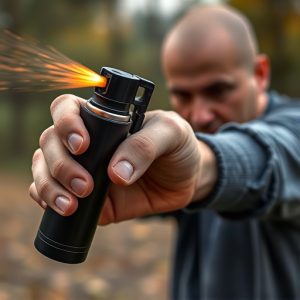Pepper Spray Laws by State: Safety, Science, & Legal Considerations
Pepper spray, powered by capsaicin from chili peppers, deters attacks with its inflammatory effects……..
Pepper spray, powered by capsaicin from chili peppers, deters attacks with its inflammatory effects. US states have varying regulations on pepper spray possession, use, and storage, as outlined in "Pepper Spray Laws by State." These laws differ based on classification of pepper spray as a weapon or defense item, influencing permits, age restrictions, and carry locations. Understanding these laws is crucial for responsible ownership, avoiding penalties, and ensuring legal compliance during self-defense or property protection.
“Discover the power of capsicum as an inflammatory agent deterrent with our comprehensive guide. We explore the science behind pepper spray and its effectiveness as a self-defense tool, delving into the chemical composition that makes it a powerful defense mechanism.
This article also provides a critical resource for understanding Pepper Spray Laws by State, offering a clear overview of regulations to ensure legal compliance. Learn about safe handling practices, potential side effects, and the legal implications of owning pepper spray, empowering you with knowledge in this life-saving tool.”
- Understanding Capsaicin: The Science Behind the Spray
- Pepper Spray Laws: A Comprehensive Overview by State
- Effective Use and Safety Precautions for Capsaicin Spray
- Legal Implications and Considerations for Pepper Spray Ownership
Understanding Capsaicin: The Science Behind the Spray
Capsaicin, the active ingredient in pepper spray, is a natural compound derived from chili peppers. Its potent inflammatory properties make it an effective deterrent in self-defense products. When sprayed onto the eyes and skin, capsaicin triggers a sensation of pain and discomfort by binding to specific receptors, leading to a rapid inflammatory response. This reaction causes temporary blindness, teary eyes, coughing, and difficulty breathing, giving users precious time to escape or defuse a potentially dangerous situation.
The science behind capsaicin spray is rooted in understanding the human body’s response to this irritant. Different states have varying Pepper Spray Laws regulating its possession, use, and application. These laws dictate who can carry pepper spray, where it can be used, and how it must be stored, ensuring public safety while also providing individuals with a means of self-defense.
Pepper Spray Laws: A Comprehensive Overview by State
In the United States, pepper spray laws vary significantly from state to state, reflecting diverse cultural and legal perspectives on self-defense and public safety. Each state has its own regulations governing the possession, use, and sale of pepper spray, also known as oleoresin capsicum (OC) spray. Some states have relatively lenient laws, allowing individuals to carry pepper spray for personal protection without a permit. Others impose strict restrictions, requiring permits or specialized training for its use.
Understanding these state-by-state differences is crucial for citizens seeking to protect themselves and their loved ones. Pepper Spray Laws by State offer a comprehensive overview of these regulations, helping users navigate legal complexities and make informed decisions about self-defense options. From requirements for purchasing pepper spray to guidelines on its application, this guide ensures folks are well-prepared and aware of their rights and responsibilities in different jurisdictions.
Effective Use and Safety Precautions for Capsaicin Spray
Capsaicin spray, often known as pepper spray, is a powerful deterrent designed to cause temporary disorientation and pain when exposed to eyes and respiratory tracts. For effective use, individuals should ensure proper training on application techniques, aiming at the target area (eyes, face, or back), and maintaining a safe distance. It’s crucial to follow Pepper Spray Laws by State, as regulations vary widely, affecting legality, permitted uses, and restrictions on carrying such devices.
Safety precautions are paramount when handling capsaicin spray. Users should wear protective clothing, including gloves and goggles, to minimize skin and eye contact. After use, thorough washing of affected areas with water is essential. Keep the spray out of reach of children and pets, store it in a cool, dry place, and never point it at anyone unintentionally. Regularly check expiration dates and maintain the spray’s integrity to ensure its effectiveness when needed.
Legal Implications and Considerations for Pepper Spray Ownership
The legal implications surrounding pepper spray ownership vary greatly across different states in the US, with each having its own set of regulations and restrictions. Pepper spray laws by state differ in terms of permit requirements, age restrictions, and places where possession is permitted or prohibited. Some states classify pepper spray as a weapon, while others consider it a defense-related item. This distinction often leads to varying levels of legal scrutiny, with certain states imposing stricter controls on who can own and carry such products.
Before purchasing a capsaicin inflammatory agent deterrent spray, individuals should familiarize themselves with their state’s specific pepper spray laws. Non-compliance with local regulations can result in severe penalties, including fines or even imprisonment. Staying informed about Pepper Spray Laws by State ensures responsible ownership and minimizes the risk of legal complications for those seeking to protect themselves or their property using this method.
Capsaicin inflammatory agent deterrent spray, while offering a powerful personal safety solution, is subject to varying legal frameworks across states. Understanding both the science behind capsaicin and the specific laws regarding pepper spray ownership in your jurisdiction is paramount. By adhering to effective use guidelines and safety precautions, you can maximize its deterrence capabilities while navigating the legal implications. Always consult local regulations to ensure compliance when carrying a pepper spray for personal protection.


